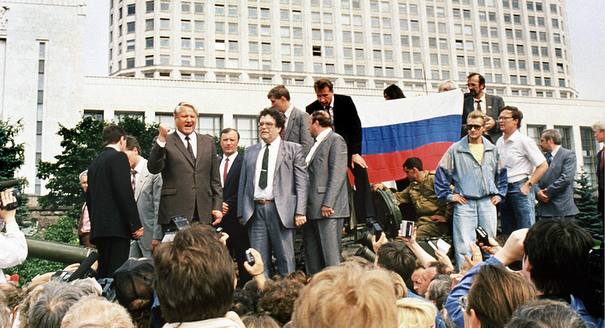Last week, a respected Moscow liberal website posted an announcement of a rally to commemorate the events of August 1991. The accompanying photo did not show President Yeltsin atop a tank or the dangling Dzerzhinsky statue—the two symbolic images of the victory of Boris Yeltsin and his supporters over the 1991 Communist coup. Instead, the image was that of the charred Russian White House —a no less historical, yet associated with much grimmer events, the 1993 micro civil war between Yeltsin and his irreconcilable opposition. The wrong photo was obviously just a mistake, but the very possibility of such an error reflects a general trend: the absence among the Russian people at large of strong feelings about Russia’s dramatic recent history.
Public opinion polls confirm this impression: the majority of people do not have an opinion about who was right or wrong in the standoff 22 years ago this week between the coup organizers and their opponents, and a plurality tend to think of the failed Communist coup as “an episode of struggle among the top leadership,” not something in which people had a part. A common answer to polling questions about the August 1991 events is “I was too young to remember.” Obviously, personal recollections are not the only way one remembers about historical developments of his or her nation. What we “remember” of our nation’s history is defined by the shared historical narrative. And the events of August 1991 are simply not part of it.
The Russian Federation in its current borders came to exist as a result of the collapse of the Soviet Union that was precipitated by the failed Communist coup. Soon thereafter Russia adopted a new Constitution which defined a democratic political system and a market economy, proclaimed freedom of economic activity and support of economic competition, and recognized and protected private property including private ownership of land. It also recognized ideological diversity and claimed that no ideology can be mandated by the state or otherwise imposed on the Russian people. All these tenets marked a radical break from what the Soviet Union stood for. But the new institutions failed to take root or serve as a basis of legitimacy for the post-Communist Russian state. “Within the Russian Federation, political scientist Stephen Hanson writes, even after the passage of two decades, there is no consensual definition of political order that might convince ordinary Russians that they have a genuine patriotic duty in upholding state institutions.”
The euphoria that accompanied what was then seen by many as a liberation from the Communist regime promptly gave way to disillusionment as the Russian people faced the post-Communist hardship, instability, and insecurity. Russia’s first president Boris Yeltsin’s victory over the Communist coup-plotters remained unappreciated by broad constituencies. His fierce anticommunism did not serve as a building block of the new Russian nationhood. Instead, it energized the Communist opposition and led to political turbulence of the 1990s, Yeltsin’s loss of support, and, eventually, his early resignation.
His anointed successor Vladimir Putin sought to distance himself from the legacy of his predecessor and anointer. He drew instead on Russia’s traditional political pattern of heavily centralized state power with no checks or balances, and a disempowered society. To Putin the defeat of the Communist regime was not an asset. Moreover, it conflicted with his idea of governance based on the unquestioned state authority. The symbolism of the August 1991 victory was abandoned, the existing differences were muffled, and no shared narrative ever emerged.
Though the post-Communist constitution remained unchanged, gradually the style of governance, as well as the state dominance over the society has come to resemble those of the late Soviet period; checks and balances were eviscerated, rights and freedoms have been increasingly constrained. These days the regime has cracked down on political defiance and locked up young people who dared to challenge the system in a peaceful rally.
Back in August 1991, crowds in Moscow rushed to rally behind Boris Yeltsin and resisted the attempt of a Communist comeback. In the Russian history this peaceful popular drive was unique: for a brief period it looked like Russia would break away from its traditional paternalism and develop a sense of “we, the people.” This is not something the current regime would celebrate.
